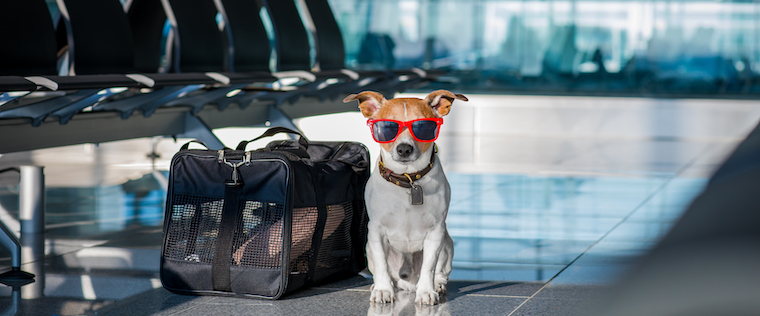It’s that time of year again – the time for planning. Whether you’re figuring out costumes or plane tickets, school holidays or dinner menus, this time of year often comes with plenty of lists, plans and schedules. One thing you’ll want to make sure is on the top of your list is the care of your pets this holiday season. Have you planned for them to be taken care of, or are you taking them with you? Both choices require planning ahead, so here are some tips to help that go smoothly.
If you’re leaving your pets at home
For many of us, traveling with our pets entails a lot of work, and may not even be feasible. If your holiday plans don’t include pets, you’ll need to have either boarding set up or a reliable pet-sitter in place.
If you need to board your pet…
- Choose your veterinarian’s office, or a place that you have visited before and trust will care for your pet properly.
- Book EARLY (that means now) as places fill up quickly over the holidays.
- Ask questions about the pets’ interactions with each other (social dogs may want to play with friends, while skittish animals may prefer private cages). Add-ons like group playtime or private kennels occasionally come with additional costs. Ask about a typical day and book the services that will make your dog or cat most comfortable.
- Prepare to show vaccination records (including Bordetella shots, which are important for boarding facilities) and be wary of any place that doesn’t require them. If your pet needs any vaccines, schedule them well ahead of when they will be boarded.
- Take your pet’s food to the facility. While many boarding places do provide food, your pet will be more comfortable (and less likely to get sick) eating what is familiar.
- Pack all medications that your pets may need with clear instructions on how to administer them.
If you have a pet sitter…
- Make sure the sitter has met and spent time with your pet before you leave. Ensure your pet is as comfortable as possible with this new person.
- Set a schedule and clearly explain your expectations. It’s perfectly reasonable to book a sitter for more than just giving food and water – you can request social time, long walks, trips to the dog park, or whatever is needed to ensure your pet is comfortable (though you will likely pay more for these services).
- Leave clear care instructions, including how to administer medications, contact information for your vet and for an emergency vet, and how to reach you.
- Check in with your sitter regularly. Ask for updates on your pet and answer any questions the sitter may have.
If you’re planning to travel with pets
- Check airplane rules. Each airline has different rules for traveling with pets. Some don’t allow any pets on certain lengths of flights and/or certain times of year. Some have strict size restrictions on carry-on pets or may require an additional ticket. Thoroughly read the pet rules on your airline’s site before booking your ticket.
- Assure a safe and comfortable ride. If you’re taking your pets in the car, arrange for them to be comfortable and safe. Buckle up dogs, when possible, though most animals are safest in crates. Include in the crate a favorite blanket or small bed, and include a small water bowl if possible. Never leave pets in the car while you take long breaks; instead, arrange to stop in places where pets can get out.
- Know where your pets can sleep. If you’re staying in a hotel, make sure you’ve checked their rules on pets. You can also find websites that list pet-friendly hotels is certain cities. If you’re staying with friends or relatives, ask about their rules for pets. You may need to bring a crate or pet bed. Don’t assume that hotels or friends’ houses will be happy to see your pet – so call ahead and make plans.
- Be prepared. Take with you all the things your pet may need: food, water, bowls, medications, towels/blankets, litter box, collar, leash, all tags, etc. Take contact information for your vet and a list of your pet’s recent vaccinations.
- Set the right pace. When traveling with pets, you can’t go the same pace on a trip that you might keep yourself. In the car, stop at least every two hours to let dogs walk around outside. Understand that your pet may be disconcerted or afraid while traveling, so arrange for extra time together for cuddles or walks. Don’t leave pets in new places for long amounts of time away from you. Help anxious or hyper dogs get their energy out; allow shy pets a cozy, dark place to escape.
Overall, remember that your pets need care too. So whether you’re home for the holidays or traveling, taking pets with you or leaving them behind – a little planning now can make for a happier holiday season for everyone.













